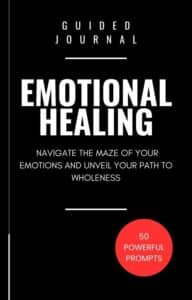In the labyrinth of life, where pathways are often paved with unexpected challenges and intricate emotions, finding solace and understanding within ourselves becomes a journey of paramount importance. Emotional healing, a voyage towards inner peace and self-discovery, requires more than just time—it demands active engagement with the deepest corners of our hearts and minds. This is where the power of journaling emerges as a beacon of light, guiding us through the shadows of our experiences towards a brighter, more enlightened version of ourselves.
“50 Journal Prompts for Your Emotional Healing Journey: Uncover, Reflect, Transform” is an invitation to embark on a personal odyssey, a series of carefully crafted questions designed to navigate the complex seas of your emotions and thoughts. Each prompt serves as a compass, directing you to explore uncharted territories within your soul, uncover hidden treasures of insight, and confront the specters of your past with courage and honesty. This collection of prompts is not merely a list but a mosaic of opportunities to delve into the narrative of your life, reframe your experiences, and emerge with a renewed sense of purpose and self-awareness.
As you stand at the threshold of this journey, remember that each word you pen is a step towards healing, each question a layer peeled back to reveal the essence of your being. Let the act of journaling be your sanctuary, a space where vulnerability meets strength, and transformation begins. With an open heart and a willing spirit, let us dive into the depths of emotional healing, uncovering the pearls of wisdom that lie within.
Emotional Healing: Navigating the Path to Inner Peace
Emotional healing is a journey that many of us embark on at various stages of our lives, often without even realizing it. It’s a process that allows us to recover from pain, trauma, and stress, leading us toward a state of emotional well-being and balance. This journey is deeply personal, unique to each individual’s experiences and circumstances, yet universally understood as a critical aspect of achieving overall health and happiness.
Understanding Emotional Healing
The Essence of Emotional Healing
At its core, emotional healing involves addressing and working through feelings and emotions that have been hurt or disturbed. It’s about acknowledging our emotional wounds, understanding them, and taking deliberate steps to heal them. This process enables us to release the burden of past traumas, negative emotions, and unresolved issues that weigh heavily on our hearts and minds.
The Signs of Emotional Wounds
Emotional wounds can manifest in various ways, affecting our thoughts, behaviors, and relationships. They might stem from childhood experiences, recent traumas, or the accumulation of daily stresses. Signs that you might be carrying these wounds include persistent feelings of sadness, anxiety, anger, low self-esteem, or difficulties in forming or maintaining relationships.
The Journey of Emotional Healing
Acknowledging the Pain
The first step toward emotional healing is acknowledging the pain and accepting that healing is necessary. This can be one of the most challenging steps, as it requires confronting often painful and uncomfortable truths about ourselves and our experiences.
Understanding and Processing Emotions
Understanding the root causes of our emotional pain involves a deep dive into our feelings and thoughts. It’s about asking ourselves why we feel a certain way and what events or circumstances might have contributed to these feelings. Journaling, therapy, and mindfulness practices can be invaluable tools in this stage.
Releasing and Letting Go
Releasing the emotions tied to our wounds is crucial for healing. This might involve forgiveness (of others and ourselves), grieving losses, or expressing feelings we’ve kept bottled up. It’s a process that allows us to let go of the hold that past pain has on our present and future.
Rebuilding and Moving Forward
With the release of old pains, we can start rebuilding our emotional selves. This involves cultivating positive emotions, building resilience, and setting healthy boundaries. It’s about rediscovering joy, love, and peace within ourselves and nurturing these feelings to flourish in our lives.
Examples of Emotional Healing
Overcoming Grief
Grieving the loss of a loved one is a profound emotional wound. Healing from this loss involves allowing ourselves to feel and express the pain of grief, finding supportive communities or individuals, and gradually finding ways to remember and honor the loved one in a manner that fosters peace.
Healing from Rejection
Whether it’s a romantic breakup or a professional setback, rejection can leave deep emotional scars. Healing might involve reassessing our self-worth independent of external validation, understanding that rejection is not a reflection of our value, and opening ourselves up to new opportunities and relationships.
Recovering from Trauma
Trauma, whether from abuse, accidents, or natural disasters, can have long-lasting emotional effects. Healing from trauma often requires professional support, such as therapy, to safely process and release the emotions tied to traumatic events, rebuilding a sense of safety and trust in the world and ourselves.
Embracing the Journey
Emotional healing is not a linear process; it involves ups and downs, setbacks and breakthroughs. It requires patience, compassion, and persistence. Yet, the journey is worth every step, as it leads us to a place of greater understanding, acceptance, and peace. Through emotional healing, we learn to live more fully, love more openly, and embrace the beauty of our existence with all its complexities.
Remember, emotional healing is a sign of strength, not weakness. It’s a courageous act of self-love that empowers us to live our best lives. So, if you find yourself on this journey, know that you are not alone, and the path you’re walking is one toward a brighter, healthier future.

The Transformative Power of Journaling for Emotional Healing
In our journey through life, we often encounter experiences that leave us emotionally bruised and searching for solace. The quest for healing and peace can lead us down various paths, but one of the most profound and accessible methods is through the simple act of journaling. This powerful practice, often underestimated, can be a beacon of light in the darkest of times, guiding you toward emotional healing and self-discovery.
What is Journaling?
The Essence of Journaling
Journaling is the act of writing down your thoughts, feelings, experiences, and reflections. It’s a dialogue with yourself, a private space where you can express your innermost emotions without fear of judgment. This practice goes beyond mere record-keeping; it’s an introspective process that allows you to explore your emotional landscape, identify patterns in your thoughts and behaviors, and ultimately, foster a deeper understanding of yourself.
The Path to Emotional Healing
Unlocking Your Emotional Narrative
At the heart of emotional healing is the understanding and processing of your emotions. Journaling acts as a key to unlocking this narrative, providing a safe and cathartic outlet for expressing pain, frustration, fear, and even joy. By putting pen to paper, you externalize what’s internal, making your emotions more tangible and, therefore, more manageable.
A Mirror to Your Soul
Journaling serves as a reflective mirror, offering you a clearer view of your emotional state. Over time, as you pour your thoughts into your journal, patterns emerge. You begin to recognize triggers that cause distress, cycles of negative thinking, and the coping mechanisms you instinctively turn to. This awareness is the first step toward change, empowering you to make conscious choices that support your emotional well-being.
The Healing Power of Narrative
Through journaling, you have the opportunity to narrate your life story, giving voice to your experiences and emotions. This narrative process is incredibly healing. It allows you to reframe and reinterpret your life’s events, finding meaning in pain and understanding in chaos. By crafting your story, you’re not just a passive observer of your life; you become the author, capable of steering your narrative in a direction that promotes healing and growth.
Transformative Benefits of Journaling
Catharsis and Release
The act of writing is inherently cathartic. It allows for an emotional release, a way to let go of pent-up feelings that may be too difficult to express out loud. This release is crucial for emotional healing, as it prevents the buildup of emotions that can lead to anxiety, depression, and stress.
Building Resilience
Journaling is not only about exploring the depths of your pain but also about discovering your inherent strength and resilience. As you reflect on your challenges and how you’ve navigated them, you’ll find evidence of your courage, adaptability, and perseverance. This realization fosters self-confidence and a belief in your ability to overcome future obstacles.
Fostering Mindfulness
The practice of journaling encourages mindfulness—a state of being present and fully engaged with the here and now. By focusing on your thoughts and feelings as you write, you anchor yourself in the moment, which can reduce stress and promote a sense of calm and clarity.
Clarifying Your Thoughts and Feelings
Sometimes, our emotions can feel overwhelming and confusing. Journaling helps to untangle these feelings, providing clarity and insight. As you write, you may discover underlying issues or emotions you weren’t initially aware of, allowing you to address them more effectively.
Embarking on Your Journaling Journey
Starting a journaling practice is simple, yet the impact it can have on your emotional healing is profound. All you need is a notebook and a willingness to be open and honest with yourself. Remember, there’s no right or wrong way to journal; it’s a personal process that should be tailored to fit your needs and comfort level.
As you embark on this journey, approach your journaling practice with patience and compassion. Healing is a process, one that unfolds in its own time. Through consistent journaling, you’ll not only navigate the complexities of your emotions but also discover a deeper sense of self-awareness, peace, and emotional resilience.
In the end, your journal becomes more than just a collection of pages; it’s a testament to your journey, a record of your growth, and a tool that continues to guide you toward a more healed, fulfilled version of yourself.

Journal Writing Prompts for Emotional Healing
- Reflect on a moment when you felt completely at peace. What were you doing, and how can you incorporate more of that into your daily life?
- Write about a time when you forgave someone. How did forgiveness impact your emotional state?
- Describe an emotion you’ve been avoiding. Why do you think you’re avoiding it, and what steps can you take to confront it?
- Think of a situation that triggers negative emotions in you. What alternate perspectives can you adopt to view it differently?
- Recall a moment when someone’s kind words deeply affected you. How can you be that source of kindness for someone else today?
- Identify a fear that holds you back. What small step can you take today to face it bravely?
- Write a letter to your younger self. What wisdom and comfort would you offer?
- Reflect on a loss you’ve experienced. What did it teach you about the value and impermanence of life?
- Describe a dream you’ve put on hold. What emotional barriers are preventing you from pursuing it, and how can you overcome them?
- Think of a time when you felt joy spontaneously. What elements can you bring into your life now to cultivate more joy?
- Write about an experience that made you stronger. How did you grow from it emotionally?
- Describe a relationship that has been healing for you. What qualities in the other person help heal your wounds?
- Identify a habit that harms your emotional health. What healthier habit can replace it?
- Reflect on a moment of clarity or epiphany in your life. How did it shift your emotional perspective?
- Write about a place where you feel completely safe and calm. What makes this place special, and how can you bring its essence into your everyday environment?
- Think of someone who inspires you to be your best self. What lessons have you learned from them about emotional resilience?
- Describe an act of self-care that makes you feel renewed. Why is it effective for you?
- Recall an emotion you’ve felt intensely this week. Explore its roots and how it’s influencing your behavior.
- Write about a challenge you’re currently facing. How can you approach it with compassion and understanding for yourself?
- Reflect on a piece of music that moves you emotionally. What memories or feelings does it evoke, and why?
- Think about a time when letting go of something (or someone) brought you peace. What did the process of letting go teach you?
- Describe a moment when you felt misunderstood. How can you communicate your feelings more clearly in the future?
- Write about a goal that’s important to your emotional growth. What practical steps can you take to achieve it?
- Reflect on a book or movie that profoundly affected your emotional outlook. What did you learn from it?
- Think of a habit that contributes to your emotional well-being. How did you develop it, and how has it changed your life?
- Write about a moment when you experienced gratitude deeply. What were you grateful for, and how did it affect your mood?
- Describe an emotional wound you’re healing from. What self-care practices are helping you through it?
- Reflect on a moment when nature had a profound impact on your emotional state. What did you feel, and why?
- Write about a form of exercise or physical activity that boosts your mood. How does movement affect your emotions?
- Think of a friendship that’s been particularly healing. What makes this relationship different from others?
- Describe an emotional breakthrough you’ve had. What led to it, and how has it changed you?
- Write about a simple pleasure that brings you immense joy. Why does it affect you so strongly?
- Reflect on a quote or mantra that helps you through tough times. How does it speak to you emotionally?
- Think of a time when you felt emotionally overwhelmed. What coping strategies did you use, and how effective were they?
- Write about an aspect of your personality you’ve come to embrace. How has accepting this part of yourself improved your emotional health?
- Describe a creative outlet that helps you process your emotions. What makes it therapeutic for you?
- Reflect on a time when you had to set a boundary for your emotional health. How did you do it, and what was the outcome?
- Write about a small act of kindness you witnessed or received. How did it impact your feelings that day?
- Think of a public figure who embodies emotional strength to you. What about their story or demeanor resonates with you?
- Describe a fear you overcame. How did conquering this fear change your emotional landscape?
- Write about a tradition or ritual that comforts you. What emotional need does it fulfill?
- Reflect on a time when you were harsh on yourself. How can you show yourself more compassion and understanding?
- Think of a moment when laughter truly was the best medicine. What were you laughing at, and how did it lighten your emotional load?
- Write about a time when patience led to an emotional reward. What did the experience teach you about waiting and timing?
- Describe an emotion you’re learning to navigate more healthily. What strategies are helping you manage it?
- Reflect on a piece of art that speaks to your soul. What emotions does it stir in you, and why?
- Think of an emotional habit you’d like to develop. What steps can you take to cultivate it?
- Write about a time when honesty opened the door to healing. What was the situation, and how did truth pave the way for emotional growth?
- Describe a moment of kindness to yourself. What did you do, and how did it make you feel?
- Reflect on the journey of emotional healing you’re on. What have been the milestones, and what hopes do you have for your emotional future?
These prompts are designed to guide you through a journey of self-discovery and emotional healing, helping you to reflect, understand, and grow in the process.
Download Printable Journal Prompts (PDF) >>
Guided Journal for Emotional Healing
50 Writing Prompts for Navigating the Maze of Your Emotions and Unveiling Your Path to Wholeness

In the tapestry of human experience, emotions thread through our lives, coloring our perceptions, guiding our decisions, and shaping our connections with the world around us. Yet, in the complexity of our emotional landscapes, we often encounter moments that challenge our peace, disrupt our harmony, and leave us seeking solace and understanding. It is in these moments that the power of journaling emerges not just as a tool but as a sanctuary for emotional healing.
Navigating the Maze of Your Emotions
Navigating through emotions can often feel like wandering through a labyrinth without a map. You might find yourself revisiting the same pain, stumbling over unresolved feelings, or standing at crossroads, unsure of which way leads to healing. The journey to emotional well-being seems fraught with confusion, and the path to understanding and peace feels obscured by the fog of our past experiences and hurts.
Within this emotional maze, there’s a deep yearning for clarity—a desire to untangle the knots of our hearts and find a way to express, process, and release the emotions that weigh us down. You might find yourself longing for a guide, a compass to navigate the intricate pathways of your heart, and a means to transform your emotional trials into stepping stones toward growth and resilience.
The Compass for Your Journey: A Guided Journal for Emotional Healing
Enter the realm of guided journaling, where the pages of a book become the map to your emotional landscape. “Unveil Your Path to Wholeness” is not just a journal; it’s a journey designed to guide you through the wilderness of your emotions. With 50 thoughtfully crafted prompts, this journal invites you to embark on an introspective adventure toward healing, self-discovery, and emotional freedom.
Each prompt in this guided journal serves as a stepping stone on your path to emotional healing. From reflecting on moments of peace to confronting avoided emotions, these prompts are your allies, encouraging you to explore the depth of your feelings, understand their roots, and navigate through them with compassion and insight.
- Unlock the Power of Forgiveness: Delve into the transformative act of forgiveness, understanding how it can liberate you from the chains of resentment and open your heart to healing.
- Confront and Embrace Your Fears: Identify the fears that hold you back and discover the courage within to face them, learning that every brave step forward strengthens your emotional resilience.
- Craft Your Narrative of Strength: Through writing letters to your younger self or reflecting on challenges that have made you stronger, you’ll weave a narrative of resilience, recognizing your growth amidst adversity.
This journal is not only about exploring the shadows but also about embracing the light. Through prompts that encourage you to recall spontaneous joy, express gratitude, and dream fearlessly, you’ll find pathways to infuse your life with positivity, hope, and fulfillment.
Embrace Your Emotional Healing Journey
“The guided journal for emotional healing” is more than a journal; it’s a companion on your journey to emotional healing. With each page turned, you’ll uncover deeper insights into your heart, foster a greater understanding of your emotional needs, and take meaningful steps toward healing and wholeness.
Are you ready to take the first step toward emotional healing and discover the wholeness that awaits you on the other side of your story?
As our journey through “50 Journal Prompts for Your Emotional Healing Journey: Uncover, Reflect, Transform” comes to a close, it’s important to recognize that the voyage of self-discovery and healing is an ongoing process. Each prompt you’ve explored is a stepping stone, a moment of introspection that contributes to the larger mosaic of your growth and understanding. The path to emotional healing is both deeply personal and universally shared, a paradox that binds us all in our quest for inner peace and fulfillment.
In reflecting on the questions posed and the insights garnered, you’ve not only engaged in a dialogue with your inner self but also taken tangible steps towards emotional resilience and clarity. The power of journaling lies in its simplicity—a blank page, a pen, and the honest thoughts that flow from your mind through your hand, capturing the essence of your emotions and experiences.
As you move forward, carry with you the lessons learned and the revelations uncovered through this process. Allow them to be your guideposts, illuminating your path as you continue to navigate the complexities of life. And remember, emotional healing is not a destination but a journey—one that is enriched by continuous reflection, acceptance, and growth.
So, as you turn the page, ready to face a new chapter in your journey, ask yourself: “What have I learned about myself that I hadn’t fully acknowledged before, and how can I use this knowledge to shape my path forward?” The answer, like the power to heal and transform, lies within you, waiting to be discovered and embraced.

